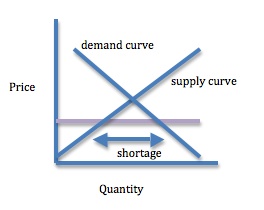Why It’s Tough to Place the Poverty Line
November 5, 2015
Weekly Roundup: From Venezuela’s French Fries to the Army’s Pizza
November 7, 2015In Venezuela, a serving of McDonald’s French fries could cost you $133.
Our story starts ten months ago when Venezuela limited McDonald’s potato imports. Because local farmers planted potatoes, the fries are back on the black market at 64 cents. Meanwhile, McDonald’s has been selling them for as high as $133 because of the official exchange rate. As one McDonald’s employee explained, “Customers have been coming in really excited. But when we tell them the price, not so much.”
Where are we going? To why prices need Adam Smith’s invisible hand.
Venezuela’s Prices
In Venezuela prices are going haywire.
Low Prices
Some Venezuelan prices are unusually low because of price controls. Creating shortages, Venezuela’s President Maduro capped the price of everyday necessities like toilet paper, rice, soap, milk and meat.
Lines are the memorable way to picture the impact of a price cap:

From: WSJ
Also, we can graph it.
Below, the horizontal purple line represents a price cap. The price cap is called a ceiling because price wants to head up to equilibrium but the ceiling stops its ascent. Crossing the supply curve before it hits demand, the ceiling creates a shortage.

High Prices
For other items, prices are rising. I’ve copied below one post from a blogger who has been collecting his own data during visits to Venezuela. Tracing the price of cornmeal cakes–arepas–he created a Hyperinflated Arepa Index (HAI):

From: devilsexcrement.com
Oil Prices
Another ingredient in the Venezuelan recipe for economic chaos is the plunge in oil prices. Hit hard by less oil revenue, Venezuela can’t afford the foreign exchange it needs for more imports. Combine ceilings, shortages and a government that needs to print money because it has inadequate oil revenue and you get a 510 percent annual rate of inflation (as of May 2015).
Venezuela’s hyperinflation:

Our Bottom Line: The Invisible Hand
Nudging the supply and demand sides of transactions with enticing incentives, the invisible hand makes markets work. So, when McDonald’s fries will cost you $133, you know that the invisible hand has really disappeared.
![econlifelogotrademarkedwebsitelogo[1]](/wp-content/uploads/2024/05/econlifelogotrademarkedwebsitelogo1.png#100878)



